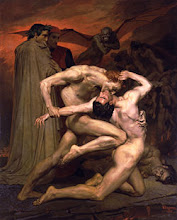Mr. Dupin observes: Perhaps its the translation,but I find it difficult to take any real meaning from XVIII other than what seems apparent on its face: "That Men Are Not to Judge Of Our Happiness Till After Death" because Fortune plays a role.
This is my reading as well. An aside, Uncle Toby: The translation I read is by Donald M. Frame. It is a 20th Century Translation first published in 1957. Mr. Dupin uses Charles Cotton's translation from the late 17th Century. John Florio's translation from the early 17th Century is the one to which I linked yesterday's post. Both Cotton's and Florio's translations are pleasing to the ear. Frame's is easier for me to understand.
Austin, though, tells me I am missing the whole point of the essay. He gives three clues to support his argument: 1. When referring to the Latin, pre-Christian writers, "fortune" is not capitalized, but when referring to the present day, "Fortune" is capitalized. 2. When reaching his conclusion, he notes, "God has willed it as he pleased...." 3. Montaigne notes three (not two or four) execrable and infamous persons whose deaths were ordered and "in every sense composed to perfection." 4. The "by his fall" language echoes the descent into hell of Jesus and other Christian references.
Austin says, we may dismiss one or two of these clues, but at three,we have to pay attention because Montaigne fills his essays with hints of his true intentions. And however much he may love the classics, Montaigne is still very much the Christian.
This, then, is the the argument Austin gives from the hints: "That our happiness must not be judged until after our death" is a rejection of the pagan virtues and an embrace of salvation through Christ. Upon death, the "power and fame" to which we aspire by a career is surpassed by something more grand and glorious than we have desired or hoped.
The pagans before Jesus recognized that "however fortune (small 'f') may smile on them, men cannot be called happy until they have been seen to spend the last day of their lives. The pre-Christian standard is the "state" of the person. If a king is captured and ends up a carpenter or clerk to Rome, his station in life has changed and he cannot be happy.
Today (Montaigne's time) we have Jesus and the present time is indicated when saying, "For it seems that, as storms and tempests are provoked to humble the pride and loftiness of our buildings," so are there "spirits up above" who are envious of grandeurs here below and will wreak havoc on human things and trample all that speaks of human eminence and laugh them all to scorn.
It further seems (again in Montaigne's Christian present tense) that "Fortune (big 'f') sometimes lies in wait precisely for the last day of our life, to show her power to overturn in a moment what she has built up over many years...."
The three execrable and infamous persons are meant to remind us of Jesus and the two thieves on the cross. And the holy trinity. Who but Jesus had a death that was "ordered and in every circumstance composed to perfection?"
By embracing Christian Grace and rejecting the ambitions and designs of man, we can gain a gallant and fortunate death. Through Christ, we may arrive where we "aspired to without going there, more grandly and gloriously" than we had desired or hoped. By our fall we may go beyond the power and the fame to which we had aspired in by our careers.
According to Austin, in this essay, Montaigne answers the question, "Does it matter, this success or failure in life?" with, "No. Success and failure are replaced by something more grand and glorious--the Peace of Christ. This is what allows us when we die to "go well, that is to say quietly and insensibly."
Mr. Dupin also notes that as with the Bible, "improper translation and interpretation can lead to unintended results." This has long concerned me. If Jesus spoke Aramaic, and then His words were written down in Greek and much later translated to English, how am I to rely on what Jesus supposedly said, not speaking or reading Aramaic or Greek?
Neither do I read French. Oh, to be an exegete.
Tuesday, May 20, 2008
Subscribe to:
Post Comments (Atom)


























_-_Dante_And_Virgil_In_Hell_(1850).jpg)























































3 comments:
Austin's argument is interesting.
However, I'm not sure that it persuades me.
I think it gives more meaning to Montaigne's words than is proper.
again, maybe if i could read his essays in French,
i would be better able to pick up his "sarcasm."
i just don't read him implying a hidden meaning.
his tone seems to reject air of an ardent christian.
i especially have trouble with the "rejection of the pagan virtues."
in my opinion, pagan and christian virtues are the same.
i think christian ideology is greatly influenced by Greek thought.
(you only have to look at the idea of a Catholic "patron saint" of this or that)
the gospels are accounts of what Jesus said (in aramaic).
nowhere in the 4 chosen gospels does Jesus call himself God.
Paul, the pagan, Greek speaking and learned guy, calls Jesus a god, but he never even met Jesus, he saw his risen spirit when Paul was on the way to beat up christians in Damascus.
Greek thought equated Jesus to Plato's "forms."
Jesus was the achieved "form" of Good.
true "forms" could not even be contemplated by the limited human mind.
some tried and the question then became,
if Jesus was a god, how could he die or allow himself to be killed by man?
If Jesus called God his "father" in the gospels, then when did Jesus arrive on the scene? was he timeless like his father?
these questions formed a number of heresies, like the Aryan.
"Christians" of different greek thought were real passionate about the "right" version.
when Constantine started sponsoring christian churches, real fist fights ensued.
hence, Constantine said enough,
called the Council of Nicea and you get the word
BEGOTTEN
in the Creed.
(at the same time, you get the "codification" of the Holy Spirit... it/he/she makes the temporal decision the right one... which is the answer to your concern about the aramaic to greek to latin to english translation problems.)
Charles Freeman's book "The Closing of the Western Mind: The Rise of Faith and the Fall of Reason" gives an excellent account of all this.
worth the read.
sorry about the rant, above.
either way,
Montaigne was, superficially, right, in my opinion.
you just gotta sit back,
take it as it comes,
try your best to live right when things don't go your way,
and hope you end up in a better place then where you are today.
AUSTIN SOUNDS LIKE A GENIUS!
CAN I HAVE HIS NUMBER??
ok maybe austin is right but that's only because he looked his interpretation up on the internet first
-kate
Post a Comment